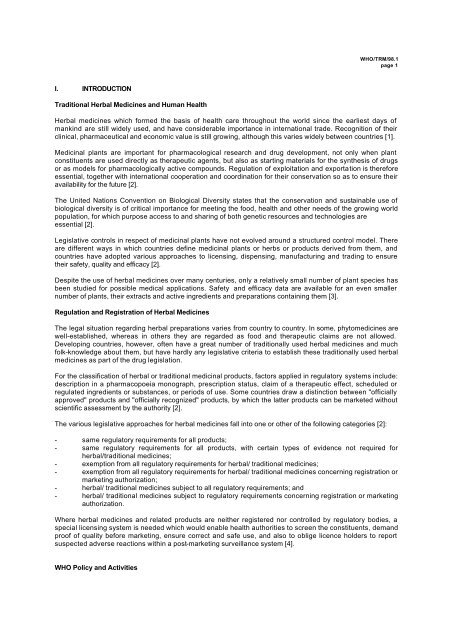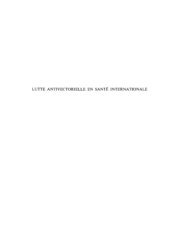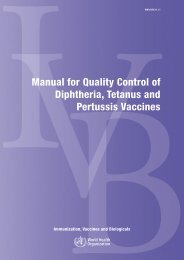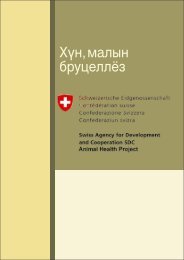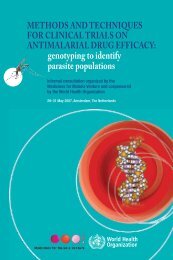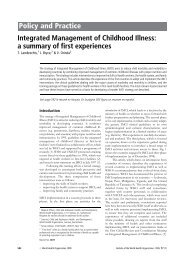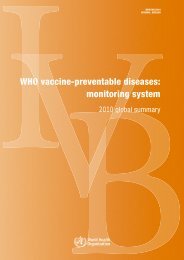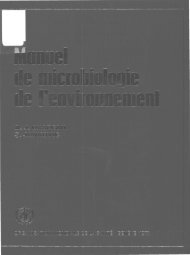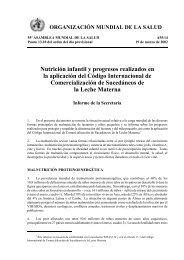Regulatory Situation of Herbal Medicines A worldwide Review
Regulatory Situation of Herbal Medicines A worldwide Review
Regulatory Situation of Herbal Medicines A worldwide Review
Create successful ePaper yourself
Turn your PDF publications into a flip-book with our unique Google optimized e-Paper software.
WHO/TRM/98.1page 1I. INTRODUCTIONTraditional <strong>Herbal</strong> <strong>Medicines</strong> and Human Health<strong>Herbal</strong> medicines which formed the basis <strong>of</strong> health care throughout the world since the earliest days <strong>of</strong>mankind are still widely used, and have considerable importance in international trade. Recognition <strong>of</strong> theirclinical, pharmaceutical and economic value is still growing, although this varies widely between countries [1].Medicinal plants are important for pharmacological research and drug development, not only when plantconstituents are used directly as therapeutic agents, but also as starting materials for the synthesis <strong>of</strong> drugsor as models for pharmacologically active compounds. Regulation <strong>of</strong> exploitation and exportation is thereforeessential, together with international cooperation and coordination for their conservation so as to ensure theiravailability for the future [2].The United Nations Convention on Biological Diversity states that the conservation and sustainable use <strong>of</strong>biological diversity is <strong>of</strong> critical importance for meeting the food, health and other needs <strong>of</strong> the growing worldpopulation, for which purpose access to and sharing <strong>of</strong> both genetic resources and technologies areessential [2].Legislative controls in respect <strong>of</strong> medicinal plants have not evolved around a structured control model. Thereare different ways in which countries define medicinal plants or herbs or products derived from them, andcountries have adopted various approaches to licensing, dispensing, manufacturing and trading to ensuretheir safety, quality and efficacy [2].Despite the use <strong>of</strong> herbal medicines over many centuries, only a relatively small number <strong>of</strong> plant species hasbeen studied for possible medical applications. Safety and efficacy data are available for an even smallernumber <strong>of</strong> plants, their extracts and active ingredients and preparations containing them [3].Regulation and Registration <strong>of</strong> <strong>Herbal</strong> <strong>Medicines</strong>The legal situation regarding herbal preparations varies from country to country. In some, phytomedicines arewell-established, whereas in others they are regarded as food and therapeutic claims are not allowed.Developing countries, however, <strong>of</strong>ten have a great number <strong>of</strong> traditionally used herbal medicines and muchfolk-knowledge about them, but have hardly any legislative criteria to establish these traditionally used herbalmedicines as part <strong>of</strong> the drug legislation.For the classification <strong>of</strong> herbal or traditional medicinal products, factors applied in regulatory systems include:description in a pharmacopoeia monograph, prescription status, claim <strong>of</strong> a therapeutic effect, scheduled orregulated ingredients or substances, or periods <strong>of</strong> use. Some countries draw a distinction between "<strong>of</strong>ficiallyapproved" products and "<strong>of</strong>ficially recognized" products, by which the latter products can be marketed withoutscientific assessment by the authority [2].The various legislative approaches for herbal medicines fall into one or other <strong>of</strong> the following categories [2]:- same regulatory requirements for all products;- same regulatory requirements for all products, with certain types <strong>of</strong> evidence not required forherbal/traditional medicines;- exemption from all regulatory requirements for herbal/ traditional medicines;- exemption from all regulatory requirements for herbal/ traditional medicines concerning registration ormarketing authorization;- herbal/ traditional medicines subject to all regulatory requirements; and- herbal/ traditional medicines subject to regulatory requirements concerning registration or marketingauthorization.Where herbal medicines and related products are neither registered nor controlled by regulatory bodies, aspecial licensing system is needed which would enable health authorities to screen the constituents, demandpro<strong>of</strong> <strong>of</strong> quality before marketing, ensure correct and safe use, and also to oblige licence holders to reportsuspected adverse reactions within a post-marketing surveillance system [4].WHO Policy and Activities


